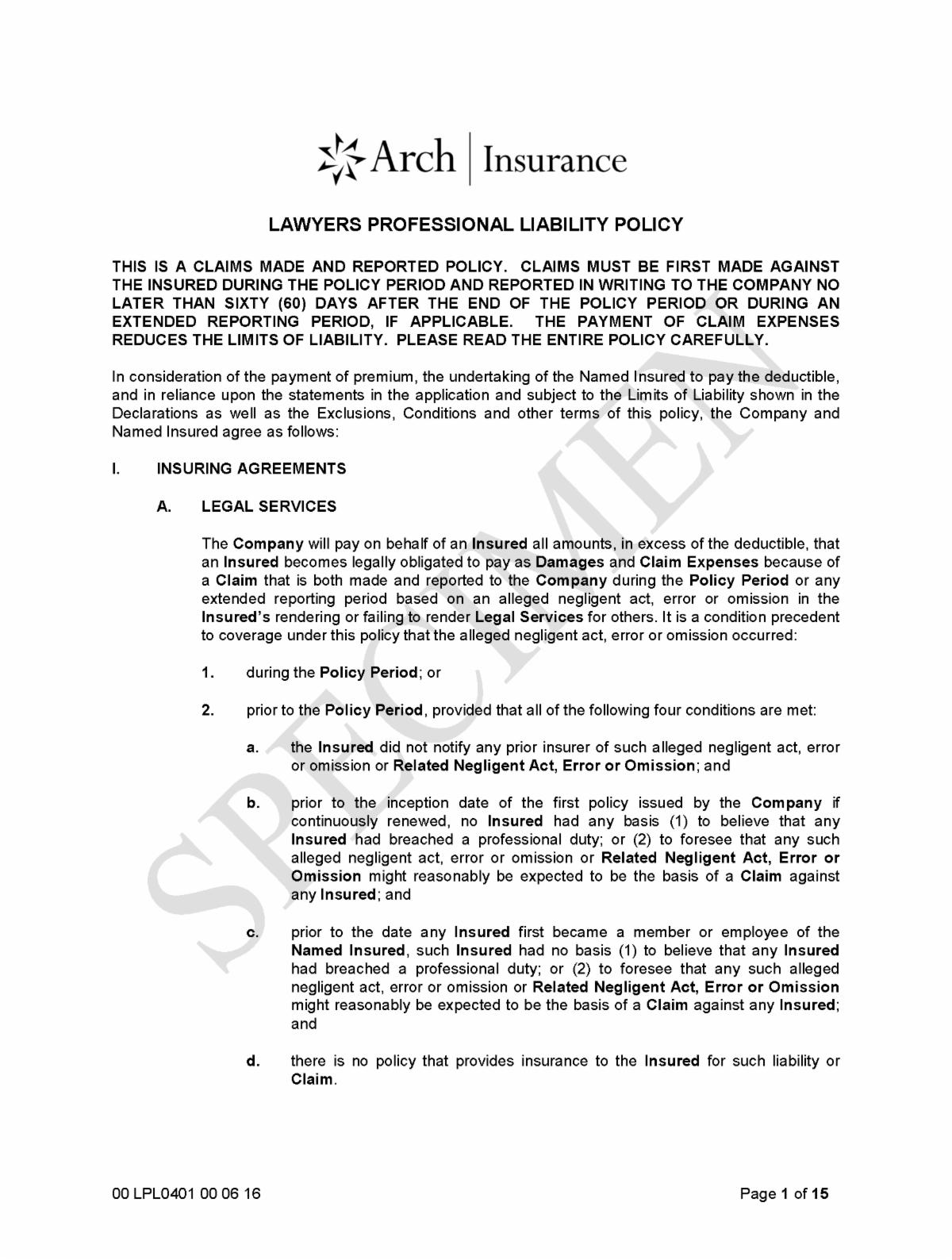
Attorney Malpractice Insurance Policies are claims-made and reported policies. When the coverage ends the ability to report claims for past acts ends at policy termination. Attorneys leaving private practice via retirement, becoming a judge or working in the private or public sector need to protect their past acts. Insurers will not renew attorney malpractice policies for attorneys that are no longer in private practice. Given this it is important for attorneys to protect their past acts once coverage ends. For solo practitioners and small firms that may close once the practitioner leaves, the nonpracticing Extended Reporting Period Endorsement/Retirement Tail (ERP) may be an answer.
Note: For attorneys closing or leaving their small firm to work at another law firm the nonpracticing Extended Reporting Period Endorsement/Retirement Tail (ERP) is not an option. Coverage for their past acts is outside of the scope of this blog.
Each insurer’s policy differs on requirements and wording for obtaining this valuable ERP endorsement at no or reduced cost. Careful planning by the attorney may save the attorney thousands of dollars. The ability to request an ERP differs by insurer but is time sensitive. Regardless of the insurer, the attorney must completely stop private practice to obtain the nonpracticing ERP.
The Arch Insurance policy provides a nonpracticing ERP based on the following policy language:
V. EXTENDED REPORTING PERIOD OPTIONS
C. UNLIMITED NONPRACTICING EXTENDED CLAIMS REPORTING PERIOD
If an Insured:
1. ceases the private practice of law during the Policy Period;
2. has been continuously insured by the Company for at least three (3) consecutive years;
3. ceases the performance of all Legal Services covered by this policy; and
4. is fifty-five (55) years of age or older;
then such Insured has the right, for no extra charge, to elect an Unlimited Non-practicing Extended Claims Reporting Period, to report Claims first made against an Insured for any actual or alleged negligent act, error or omission occurring prior to the termination of the Policy Period and otherwise covered by this policy. Such Unlimited Non-practicing Extended Claims Reporting Period must be elected within sixty (60) days of the Insured’s retirement or ceasing of the private practice of law.
D. DEATH OR DISABILITY OF AN INSURED EXTENDED CLAIMS REPORTING PERIOD
If an Insured dies during the Policy Period, such Insured will be provided with a Death Extended Claims Reporting Period commencing after the termination of the Policy Period at no additional premium until the executor or administrator of the estate is discharged, provided always that the death did not result from an intentionally self-inflicted injury, suicide or alcohol or drug abuse, and provided always that written notification and written proof of death of the Insured is provided within sixty (60) days of the date of death or prior to the end of the Policy Period, whichever is earlier.
If an Insured becomes Totally and Permanently Disabled during the Policy Period, such Insured will be provided with a Disability Extended Claims Reporting Period commencing after the termination of the Policy Period at no additional premium until the Insured is no longer Totally and Permanently Disabled. A condition to the extended reporting period for total and permanent disability will be that the Insured has had continuous coverage with the Company for at least three (3) consecutive prior full years, the Insured or his legal guardian provides written notice of the disability to the Company within sixty (60) days or prior to the termination of the Policy Period, whichever is earlier, and the Insured or the Insured’s legal guardian provides a physician’s written certification of the disability, including the date it began.
E. ALL REPORTING PERIOD OPTIONS
1. The right to any of the extended claims reporting period options is not available to any Insured where termination or nonrenewal by the Company is due to nonpayment of premium, the Named Insured’s failure to comply with any term and condition of this Policy, fraud or material misrepresentation, or other money due to the Company or if the Insured has had his or her license to practice law suspended or revoked.
2. The Limits of Liability available for any extended claims reporting period option is part of, and not in addition to, the Limits of Liability shown on the Declarations of the expiring policy. The deductible as shown on the Declarations will apply separately to each and every Claim under any extended claims reporting period option. The deductible will be waived in the event of the death of the Insured or in the event the Insured becomes Totally and Permanently Disabled.
3. None of the extended claims reporting period options are cancelable. None of the extended claims reporting options are renewable. The additional premium for the Optional Extended Claims Reporting Period is fully earned at the inception of the Optional Extended Claims Reporting Period.
VII. DEFINITIONS
I. Insured means:
1. Named Insured, which is the entity shown in Item 1 of the Declarations;
2. any lawyer or professional corporation listed in the application on the day the Policy Period incepts until such time as the lawyer or professional corporation ceases to be a member of the Named Insured subject to section 4 below;
3. any lawyer or professional corporation who becomes a partner, officer, director, stockholder or shareholder or employee of the Named Insured during the Policy Period until such time as the lawyer or professional corporation ceases to be a member of the Named Insured subject to section 4 below;
4. any lawyer or professional corporation who is a former partner, officer, director, stockholder or shareholder or employee of the Named Insured or Predecessor Firm, but only in rendering or failing to render Legal Services on behalf of the Named Insured or Predecessor Firm;
5. any person or entity who is designated by the Named Insured as counsel or of counsel in the application, but only in rendering or failing to render Legal Services on behalf of the Named Insured;
6. any other person who is employed or retained by the Named Insured as a legal secretary, paralegal, contract attorney or other legal office staff member, but only in rendering or failing to render Legal Services on behalf of the Named Insured and also only within the scope of such employment or retention agreement; and;
7. the estate, heirs, executors, administrators, assigns and legal representatives of any Insured in the event of such Insured’s death, incapacity, insolvency or bankruptcy, but only to the extent that such Insured would otherwise be provided coverage under this policy.
Q. Totally And Permanently Disabled means the Insured is wholly prevented from rendering Legal Services, provided that the disability has continued for at least six (6) months, is reasonably expected to be continuous and permanent and the disability did not result from intentionally self-inflicted injury, attempted suicide, alcohol or drug abuse.
Switching insurers near retirement to save a few dollars may cost an insured attorney thousands of dollars to buy the same protection. Planning retirement or a transition out of private practice should be discussed with your malpractice insurance agent prior to ending private practice when possible.
CLICK HERE TO OBTAIN AN ATTORNEY MALPRACTICE QUOTE

Lee Norcross, MBA, CPCU
(616) 940-1101 Ext. 7080